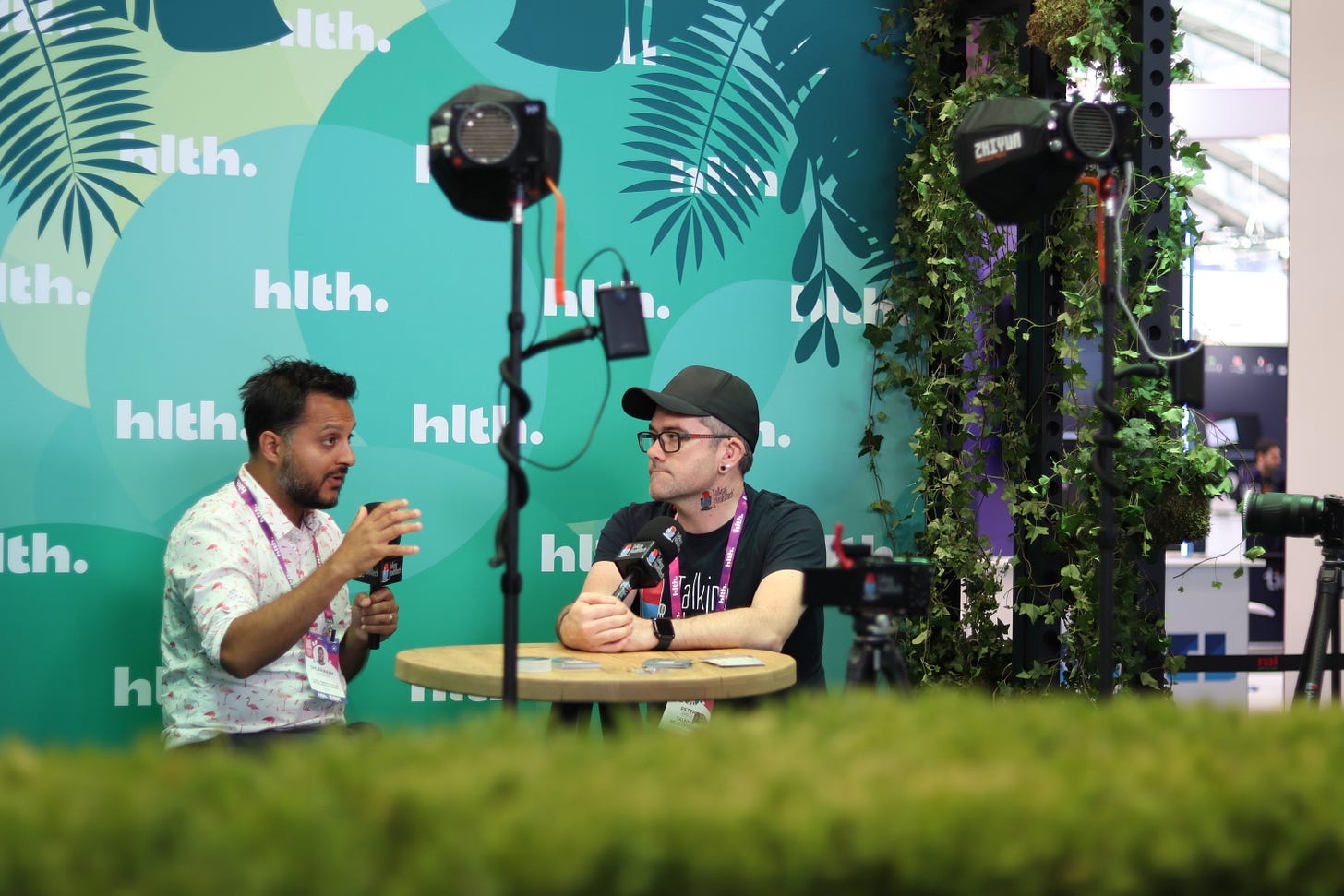Spotlight on underserved communities at HLTH Europe
Sharing an oft missed perspective from the conference circuit
Big thanks to Harry Salt of Future Medicine AI for this photo talking to Peter Birch of Talking Health Tech. Stay tuned for our discussion on underserved communities in Australia.
What did Europe’s biggest and glitziest health tech conference teach us about the state of the industry in 2025?
I was fortunate to chair the first day’s session on Clinicians in tech, where some of the most inspiring clinicians in health tech covered the challenges of career, staying fresh and relevant and how we best integrate clinicians so that we move fast AND safe.
I spent the rest of the time meeting some inspiring folk across disciplines- engineers, product managers, data scientists and fellow clinicians. Your Linkedin feeds would have been full of this power of connection in person, and it was great.
What was likely missing from your feeds, and from the industry’s content in general is some of the stuff I want to share here. So often, the narrative on digital health and AI in healthcare centres around the US, Europe, UK.
And the rest of the world is brought into the conversation as an aside: “emerging markets”. Learning is thought of as one way - how do we take our shiny great tools and reach people in the last mile in under resourced settings?
Yet our ‘high income’ settings grow ever less-resourced. We have healthcare deserts. We have real challenges with certain communities having pretty terrible outcomes.
Perhaps we might open our minds to learn from the challenges, successes and learnings of people who have been striving to overcome these types of challenges in arguably more acutely challenging settings.
And of course without some of our legacy infrastructure hurdles, fragmentation and perverse financial incentives.
I tried to find and speak to some people at HLTH who could bring us some of that learning. Here’s two of them.
Remidio
Scaling impact from rural India to rural Europe and the US
Remidio have developed a portable, AI-powered tool that enables community health workers across India to screen for diabetic retinopathy, glaucoma, and age-related macular degeneration.
The device has already reached over 40 million people across India. No dilation required, no specialist training needed. Their solution was built for last mile impact in rural communities. They came to Health Europe because they’re seeing the same access issues in rural parts of Europe and the US, and there’s clearly a market to serve and impact in high income settings too.
🎥
I am looking forward to our deep dive podcast episode with the Remidio team where we’ll go into their work, challenges and impact, so stay tuned.
What local leadership and ownership should actually look like: Guy Parsons
I also caught up with Guy Parsons, a UK-trained doctor now working to bridge system-level digital health implementation gaps in Malawi.
Guy shared a story about the impact of a preventable, untreated vision condition on a young boy at school. It was a reminder that investment in health tech is meaningless unless it's designed and implemented in ways can actually improve people’s lives. We talked about what it really means to listen, and how tempting it can feel to just throw earmarked money at an assumed problem.
Guy also reflected on how assumptions from funders and implementers can inadvertently cause harm, and how his role often involves translating context back to the people funding and making decisions on digital health investments.
🎥
There was also a fantastic discussion on the final day on migrant and refugee health. Nadia Kadhim of Naq absolutely hit the nail on the head when she spoke about the importance of digital identity for refugees and displaced people. Expertly chaired by Sam Shah and great discussion from Nadia and Dr Wahid Arian. Kudos to the HLTH Europe team and the panelists for this.
Plus stay tuned for a great recording with Peter Birch of the Talking Healthtech Podcast about the challenges in Australia with Indigenous and Torres Strait Islander communities, health data poverty and more.
I really hope that this type of discussion and two way learning from all contexts can be shared more, and I’d love to help this take a bigger stage at HLTH Europe 2026.
Want to learn more about what it takes it create impact for underserved communities, and learn from implementation in other parts of the world?
Tune in to gpodh.org. Subscribe on Youtube, follow us on all podcast platforms.


